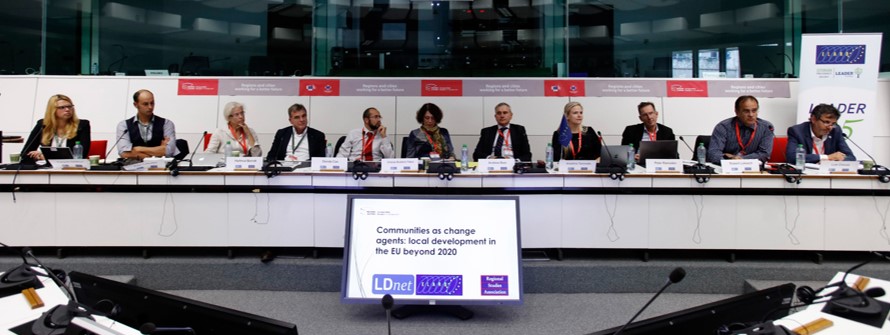On 10 October 2017, LDnet co-organised with ELARD a workshop on “Communities as change agents: local development in the EU beyond 2020” as part of EWRC 2017. It was followed by a networking session co-hosted by the Regional Studies Association. An impressive line-up of local practitioners and international experts led a lively debate, with many contributions from the floor, highlighting the strengths of the LEADER/CLLD approach to local development, the challenges encountered in the 2014-2020 period, and how CLLD should look like post-2020.
For workshop presentations and conclusions of the debate – see below.
Presentations

The event was moderated by Urszula Budzich-Tabor, Vice President LDnet / FARNET and included:
Presentations by local practitioners from different countries focusing on specific results achieved:
- Hartmut Berndt (DE), German LEADER Association / BAG LAG e.V. (green energy)
- Alina Lukjanceva (LV), Pierigas partneriba (urban-rural linkages)
- François Galabrun (FR), LEADER France / Gal de l’est-audois (LAG) (business development)
- Pirjo Tulikukka (FI), Helsinki Neighbourhoods Association
- Davide Cao (IT), FLAG Sardegna Orientale
These presentations are available by clicking on the following link: [bsk-pdf-manager-pdf id=”23″]
Panel discussion:
- Kristiina Tammets, President ELARD
- Luís Chaves, Portuguese LEADER Network Minha Terra
- Peter Ramsden, LDnet / URBACT / Freiss ltd
- Robert Lukesch, LDnet / ÖAR
- Professor Andrew Beer, Chair RSA
Networking around the following thematic tables:
- Evaluating the impact of CLLD at local, regional, national & EU levels (What can CLLD do? How to measure it? …): Loris Servillo, University of Leuven, Department of Architecture, Urbanism and Planning (RSA); Elena Tagliani, Regione Emilia-Romagna (RSA); Robert Lukesch, LDnet
- Methodologies for evaluating the efficiency of delivery systems for CLLD (what does „efficient delivery” mean?…): Peter Ramsden, LDnet; Urszula Budzich-Tabor, LDnet
- Community resilience and CLLD (Can CLLD contribute to community resilience and in what way? Can this be measured? …): Andrew Beer, RSA; Vanessa Halhead, ERCA
- Environmental impacts of local decision-making: Pedro Brosei, ELARD
Conclusions
Realising the full potential of CLLD
 Community-led Local Development (CLLD) has a high potential to address challenges of different types of areas (rural, fisheries and urban) and to contribute substantially to business development, job creation, sustainable energy production, community cohesion, cooperation between EU territories. In the period post-2020 CLLD can be an important factor in maintaining the relevance of EU cohesion policy for local actors.
Community-led Local Development (CLLD) has a high potential to address challenges of different types of areas (rural, fisheries and urban) and to contribute substantially to business development, job creation, sustainable energy production, community cohesion, cooperation between EU territories. In the period post-2020 CLLD can be an important factor in maintaining the relevance of EU cohesion policy for local actors.
The discussion confirmed that CLLD can deliver sustainable solutions because of the unique methodology it applies, and its ability to motivate and bring together different actors. Allocation of a significant part of cohesion policy funding to CLLD in the post-2020 period would help to bring out its full potential, also in urban areas, where there has been a low uptake of CLLD funding so far.
Capturing the ‘added value’ and impact of CLLD
A key aspect of the ‘added value’ of CLLD is the empowerment of the local community and the participatory character of decision-making. To stimulate this, the local action groups (LAGs) need skills and resources for a wide range of animation activities, and this need is likely to increase in the future.
In CLLD, its capacity of bringing people together to generate new ideas is considered to be at least as important as the funding of projects. The discussion demonstrated that while CLLD does deliver tangible results, its long-term impacts (e.g. in terms of community resilience or changing mindsets), are extremely difficult to measure; a significant effort of practitioners and researchers is needed to address this.
Putting efficient delivery systems in place
The success of CLLD depends on efficient delivery systems which are adapted to the bottom-up character of the approach, ensure a high level of autonomy of the local decision-making process and enable a flexible, non-bureaucratic policy response to local needs. What is now in place is woefully inappropriate and an in-depth reflection of the CLLD delivery systems is urgently needed. The simplification agenda needs to reach out to all the levels of the delivery chain, down to the local beneficiaries, and solutions could include treating the whole local strategy as a single grant.
A variety of solutions were suggested, including the possibility of treating the whole local strategy as a single grant. Participants stressed the need for proportionality of controls in case of small-scale projects and improving access to EU funding for citizens and NGOs. The importance of trust across the delivery chain, willingness to share power with lower levels and avoiding “gold-plating” were mentioned, as well as the need for programme authorities of the different EU Funds to fully understand the specificity of the CLLD approach.
Leave a Reply
You must be logged in to post a comment.